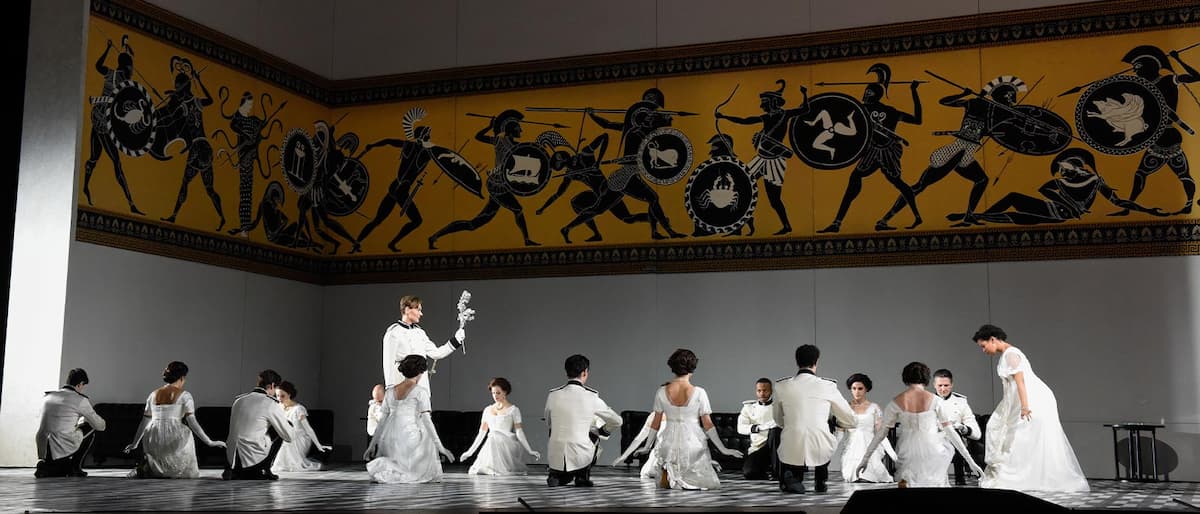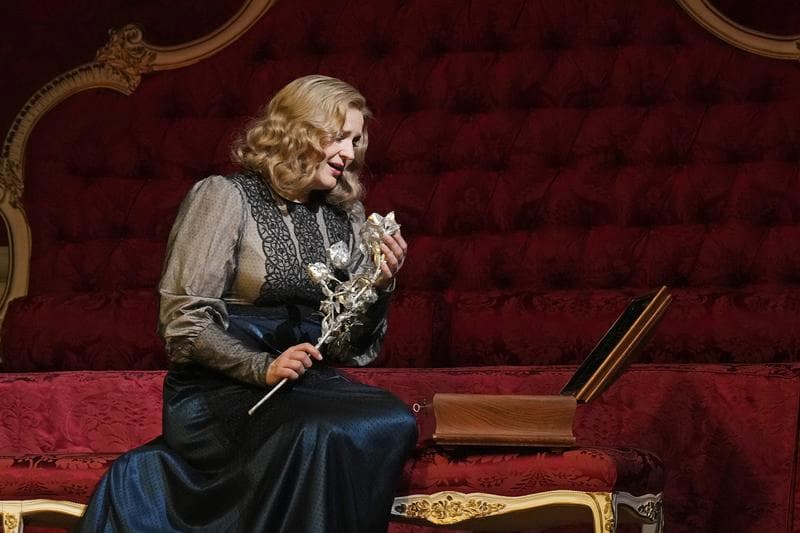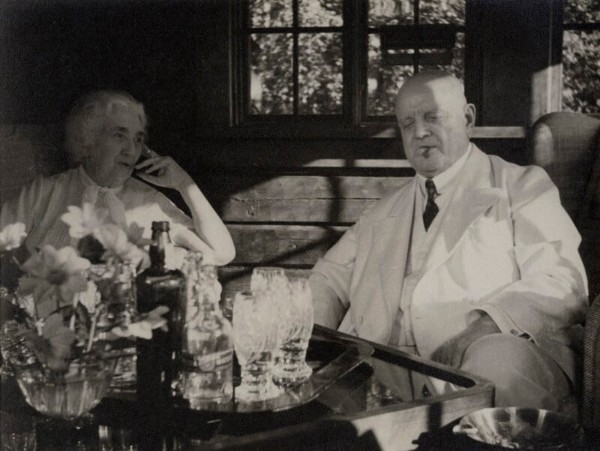Today my husband and I were treated to the most overwhelming experience: hearing and seeing Der Rosenkavalier the comic opera in three acts by Richard Strauss transmitted live on Saturday April 15, 2023. How fortunate that those of us who cannot be in New York to experience the Metropolitan Opera can watch it live in HD.
Watch excerpts of Der Rosenkavalier

© Metropolitan Opera Co.
Richard Strauss wrote the opera from 1909-1910 and the score is lush and symphonic. The large orchestration, including unusual instruments such as a basset horn, bass clarinet, bass tuba, a large variety of percussion instruments, harmonium, celeste, 2 harps, an extra-large string section, and an off-stage orchestra, propels the audience in huge sweeps of sound. Strauss showcases three female leads—the “pants” role of Octavian is played by a mezzo-soprano, Sophie by a lyric soprano, and the Marschalin by a dramatic soprano. When all three sing together towards the end of the opera at the climax, it is writing that is simply stunning and never fails to bring tears to my eyes.
The partnership with librettist Hugo von Hofmannsthal is legendary, a collaboration through six operas. In this opera, Hugo von Hofmannsthal created each character’s dialogue to reflect the character’s station in life. Members of the aristocracy use refined speech; in privacy, the characters speak in the more informal vernacular, whereas elsewhere Hofmannsthal inserts Austrian dialect to emphasize social standing. Thus Baron Ochs, makes boorish and affected attempts at using sophisticated language even to the point of making grammatical blunders. It’s very rich and adds to the depth of the opera and the feelings of loss, of fear, of youthful exuberance.

© Metropolitan Opera Co.
The opera has four main characters: the highborn Marschallin; her teenage lover, Count Octavian Rofrano; her crude cousin Baron Ochs; and Ochs’ prospective fiancée, Sophie von Faninal, the daughter of a rich merchant. Octavian is chosen to present the ceremonial silver rose of betrothal to Sophie, as Ochs’ Rosenkavalier. But as soon as the young people encounter each other they fall in love on the spot. Ochs is such a brute and behaves with scandalous licentiousness that Sophie and Octavian devise a plan to extricate Sophie from her engagement. Octavian disguised as a chambermaid agrees to a rendezvous with the unwitting Ochs. In the end, Faninal is confronted by the evident debauchery of his prospective son-in-law. Marschallin, who has predicted that someday Octavian will seek a younger woman, yields Octavian to Sophie.
This tale presents themes that include timeless issues such as infidelity, greed, snobbishness, especially regarding class distinctions, the inevitability of aging, sexual predators, and an example of selfless love.
Throughout, the sets and costumes are dazzling. We see ornate period costumes and the replica of an aristocratic Viennese drawing room and bedroom, complete with ornate furniture, paintings, and parquet floors. In Act II the scene transforms into a beautiful ballroom, the floor now in a black and white tile, with an Egyptian frieze traversing the entire stage. All the characters and dancers don dazzling white to emulate the pure white of Sophie’s wedding dress. Then, in Act III the scene of Ochs attempted seduction of the chambermaid, multiple doors of a bordello appear, behind which there are lovers in all stages of undress.

Lise Davidsen is holding the rose of the Marschallin © Metropolitan Opera Co.
And what a remarkable cast—soprano Lise Davidsen as the mature Marschallin, mezzo-soprano Samantha Hankey as her lover Octavian, and soprano Erin Morley as Sophie, the lovely younger woman who steals his heart. Bass Günther Groissböck portrays the boorish Baron Ochs, and Brian Mulligan is Sophie’s affluent father, Faninal. With Robert Carsen’s fin-de-siècle staging conducted by Simone Young it’s a tour de force. To say the work is challenging for all the singers and the orchestra is an understatement!
To add to the mesmerizing afternoon, during the two intermissions, the host in this case Deborah Voigt, led us backstage to see behind-the-scenes rehearsals, set changes, and clips of conversations with the maestro; Voigt interviewed the stars of the production, and she even showcased the five dogs who made their onstage MET debuts!
Final trio Fleming, Battle, von Stade, Abbado
Strauss approved the 1945 Der Rosenkavalier orchestral suite that is a favorite with audiences and is frequently programmed. I had the privilege of playing it many times. The music is spine-tingling. It begins brilliantly with demands placed upon the horns and strings that defy description. The music is romantic and lush, full of gorgeous melodies and waltzes, and harkens back to another age. The style is quite a contrast to Elektra, the opera Strauss wrote before this work, which scandalized audiences. There are different versions of the suite that range from eight minutes to twenty-five, none of them put together by Strauss himself but all are excerpts of favorite moments from the opera.
Richard Strauss: Der Rosenkavalier Suite, Op. 59, TrV 227 (London Symphony Orchestra; Erich Leinsdorf, cond.)
The next Metropolitan Opera broadcasts in the theaters are not to be missed. Champion by the six-time Grammy Award winning composer Terrance Blanchard, tells the rags to riches story of boxer Emile Griffith, the prizefighter who tragically killed his rival in the ring Saturday April 29. Two Mozart operas follow Don Giovanni Saturday May 20, and Die Zauberflöte Saturday June 2.
If the MET isn’t available where you are located, audience members can tune in to other notable operatic performances such as from the Royal Opera House, London. On Medici.tv, listen to the Paris Opera company’s presentation of John Adams‘ contemporary masterpiece Nixon in China—a gorgeous score conducted by Gustavo Dudamel, with operatic luminaries Renée Fleming and Thomas Hampson portraying the Nixons. The brilliant production by Argentine director Valentina Carrasco captivates with his imposing, kinetic set pieces. The audience reacted with a huge ovation that followed the opera’s Paris premiere this month.
There is nothing quite like being in an opera house and to experience live opera, but since we are so fortunate with today’s technology we can attend in the theater—a great way to spend an afternoon.
For more of the best in classical music, sign up to our E-Newsletter



